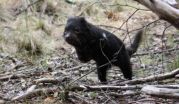(Press-News.org) This news release is available in Spanish.
In view of the changes that have taken place in Europe,JuleGoikoetxea, a lecturer at the UPV/EHU's Faculty of Social Sciences and Communication, has been conducting research into "the conditions needed for a people to become a democracy or sustain its democratisation process over time."The study has been published in the specialised journal Nationalities Papers.
According to Goikoetxea, nation is not synonymous with demos: "The nation is the will, socially and historically articulated, that a group has in order to be a political subject.The demos refers to the way of turning that will into reality."In fact, a nation can have different political systems; it does not have to be a democracy.Nevertheless, in democratisation processes nations are turned into demoi, in other words, into human groups that govern themselves," added Goikoetxea, who did her research at the University of Cambridge where she also studied Political Science.
Having drawn the distinction between demos and nation, Goikoetxea adds that the demos has two dimensions: the objective one and the subjective one. The subjective one refers to the common identities, interests and beliefs held by the population.These beliefs, identities and interests, if they are to become common and be sustained over time, need the objective dimension of the demos, which refers to the public institutions, preferably the state ones, since "the state institutions are the objective (i.e. institutionalised) setups that wield greater political power, and let us remember that political power is a power that creates social reality, and therefore, the one able to bring about socio-economic and political equality, which is the basis of every democratisation process.
The Basque case
So for Basque democracy to be possible, the researcher regards two variables as necessary: firstly, the Basque state institutions should have enough political power to control the population, and secondly, these institutions need to be capable of carrying out the demands and priorities of Basque society.
Goikoetxea speaks of reproduction, because the process to create the Basque demos would not start from scratch; "that is why I say that it's a reproduction, although new elements always emerge in a process in which something is produced anew," she asserts. She goes on to say, "The concept of reproduction is the key component when it comes to explaining a people's survival over time and in a space. At the end of the day, the most important thing in politics is not creation but survival."
The importance of social protest in the process to create the demos is also highlighted by Goikoetxea.In her view, "a certain dynamic between Basque state institutions and Basque society is indispensable to enable a democratisation process to take place. Why? Because in democracy the institutions realize social demands, however, in order to achieve that, society must become an organised society. And an organised society is one that engages in protests by means of which the social players articulate the demands of that society. Without protests and action, society as a whole cannot articulate its demands."
On this point Goikoetxea is pessimistic with respect to the current situation of democracy in Europe. In her view, when social movements, trade unions and political parties are unable to articulate the demands of society, it is the lobbies that take their place."In other words, protests and action are necessary for democratisation to become reality; otherwise, the institutions respond to the demands of the lobbies. Democratisation is possible only within a dynamic of contention."
However, according to the UPV/EHU's researcher, since the start of the crisis, the lobbies have seized power:"Throughout Europe the institutions are subordinate to the economic elite, and now we're suffering the effects of this.The consequences are also very serious.We are not moving deeper into democracy; quite the opposite, a regression has taken place:we are right in the midst of a de-democratisation process. And in the Basque Country the situation is worse, if anything, because the public institutions which are supposed to implement our demands depend on the central governments of Spain and France, and these governments respect neither the Basque institutions nor the demands of the Basques."
INFORMATION: END
The conditions for a society to become a democracy are analyzed
Jule Goikoetxea, a UPV/EHU-University of the Basque Country political science researcher, studies the conditions that a democracy needs in order to be sustained over time
2014-02-18
ELSE PRESS RELEASES FROM THIS DATE:
Researchers shed new light on the genetic history of the European beaver
2014-02-18
An international team of scientists has used detailed analysis of ancient and modern DNA to show that the distribution and lack of genetic diversity among modern European beavers is due largely to human hunting.
The research, which was led by University of York researcher Professor Michi Hofreiter, provides important new insights into the genetic history of the Eurasian beaver Castor fiber. Crucially, it shows the European beaver has been strongly affected by expanding human populations for many thousands of years.
The researchers say that centuries of hunting, rather ...
Surprising survey: Most small businesses remain silent rather than report employee theft
2014-02-18
In a recent survey of small businesses, a University of Cincinnati criminal justice researcher has found that only 16 percent of those that have experienced theft by employees actually reported that theft to the police.
That's even though 64 percent of the small businesses surveyed reported experiencing employee theft.
These are some of the findings in a survey of small businesses that examined the incidence of employee theft, how often it was reported, the types of goods taken by employees, the types of employees most likely to commit theft, and the reasons the business ...
Einstein's conversion from a static to an expanding universe
2014-02-18
Until 1931, physicist Albert Einstein believed that the universe was static. An urban legend attributes this change of perspective to when American astronomer Edwin Hubble showed Einstein his observations of redshift in the light emitted by far away nebulae—today known as galaxies. But the reality is more complex. The change in Einstein's viewpoint, in fact, resulted from a tortuous thought process. Now, in an article published in EPJ H, Harry Nussbaumer from the Institute of Astronomy at ETH Zurich, Switzerland, explains how Einstein changed his mind following many encounters ...
Daily walk of just 3km can reduce risk of hospitalization for respiratory problems
2014-02-18
New research in Respirology shows that suffers of Chronic obstructive pulmonary disease (COPD) can reduce their risk of being hospitalized with severe attacks, by maintaining an exercise regime of walking between three to six kilometers a day.
COPD, a term which includes chronic bronchitis and emphysema, results in breathing difficulties due to long-term lung damage. Severe symptoms (eCOPD), caused by a sudden loss of lung function, can be life threatening.
543 COPD patients were recruited from five Spanish respiratory clinics and their exercise levels were calculated ...
Magnesium may protect against hip fractures
2014-02-18
Drinking water with a relatively high concentration of magnesium protects against hip fractures, according to results of a study from the Norwegian Institute of Public Health.
There are considerable variations in the quality of drinking water in Norway. The researchers studied variations in magnesium and calcium levels in drinking water between different areas, as these are assumed to have a role in the development of bone strength. They wanted to examine whether there was a correlation between magnesium and calcium concentrations in drinking water and the incidence ...
Beauty & bacteria: Slim, attractive men have less nasal bacteria than heavy men
2014-02-18
Do attractive traits tell us anything about a person's reproductive health? New research in the American Journal of Human Biology reveals a link between Body Mass Index (BMI) and the amount of bacteria colonizing noses. The results show that heavier men harbor more potentially pathogenic species of bacteria in their nose, compared with slimmer, more traditionally attractive men.
"According to an evolutionary point of view, traits related to attractiveness are supposed to be honest signals of biological quality," said Dr. Boguslaw Pawlowski. "We analyzed whether nasal ...
Malnutrition decreases effectiveness of HIV treatment in pregnant African women
2014-02-18
In Uganda the prescription of three antiretroviral (ARV) drugs, which aim to suppress the virus to prevent disease progression, have resulted in huge reductions in HIV mortality rates. However, disease is not the only scourge in Uganda, and a new study in The Journal of Clinical Pharmacology explores the impact food insecurity may have on treating pregnant women.
A U.S-Ugandan research team explored the affect pregnancy and malnutrition can have on the administration of lopinavir/ritonavir (LPV/r) and efavirenz (EFV) drugs among HIV-infected women in Tororo, Uganda.
Blood ...
Infected Tasmanian devils reveal how cancer cells evolve in response to humans
2014-02-18
Tasmanian Devil Facial Tumour Disease (DFTD) has ravaged the world's largest carnivorous marsupial since it emerged in 1996, resulting in a population decline of over 90%. Conservation work to defeat the disease has including removing infected individuals from the population and new research in Evolutionary Applications explains how this gives us a unique opportunity to understand how human selection alters the evolution of cancerous cells.
DFTD is an asexually reproducing clonal cell line, which during the last 16 years has been exposed to negative effects as infected ...
Computer arranges pictures based on their artistic aspects
2014-02-18
This news release is available in German.
Until now, it has been a time-consuming process for a program to arrange pictures in a consistent order. It is even more complex to order them on the basis of visual characteristics. Computer scientists from Saarbrücken have developed a system to arrange pictures into a consistent order. It requires no more than a small number of pre-sorted example pictures. Operators of online portals or museums could use this technique, for example, to arrange complex datasets.
So far, if a nature photographer wanted to arrange pictures ...
Scientists chip away at the mystery of what lives in our mouths
2014-02-18
COLUMBUS, Ohio – Scientists have pieced together sections of DNA from 12 individual cells to sequence the genome of a bacterium known to live in healthy human mouths.
With this new data about a part of the body considered "biological dark matter," the researchers were able to reinforce a theory that genes in a closely related bacterium could be culprits in its ability to cause severe gum disease.
Why the dark matter reference? More than 60 percent of bacteria in the human mouth refuse to grow in a laboratory dish, meaning they have never been classified, named or studied. ...
LAST 30 PRESS RELEASES:
Bacteria frozen in ancient underground ice cave found to be resistant against 10 modern antibiotics
Rhododendron-derived drugs now made by bacteria
Admissions for child maltreatment decreased during first phase of COVID-19 pandemic, but ICU admissions increased later
Power in motion: transforming energy harvesting with gyroscopes
Ketamine high NOT related to treatment success for people with alcohol problems, study finds
1 in 6 Medicare beneficiaries depend on telehealth for key medical care
Maps can encourage home radon testing in the right settings
Exploring the link between hearing loss and cognitive decline
Machine learning tool can predict serious transplant complications months earlier
Prevalence of over-the-counter and prescription medication use in the US
US child mental health care need, unmet needs, and difficulty accessing services
Incidental rotator cuff abnormalities on magnetic resonance imaging
Sensing local fibers in pancreatic tumors, cancer cells ‘choose’ to either grow or tolerate treatment
Barriers to mental health care leave many children behind, new data cautions
Cancer and inflammation: immunologic interplay, translational advances, and clinical strategies
Bioactive polyphenolic compounds and in vitro anti-degenerative property-based pharmacological propensities of some promising germplasms of Amaranthus hypochondriacus L.
AI-powered companionship: PolyU interfaculty scholar harnesses music and empathetic speech in robots to combat loneliness
Antarctica sits above Earth’s strongest “gravity hole.” Now we know how it got that way
Haircare products made with botanicals protects strands, adds shine
Enhanced pulmonary nodule detection and classification using artificial intelligence on LIDC-IDRI data
Using NBA, study finds that pay differences among top performers can erode cooperation
Korea University, Stanford University, and IESGA launch Water Sustainability Index to combat ESG greenwashing
Molecular glue discovery: large scale instead of lucky strike
Insulin resistance predictor highlights cancer connection
Explaining next-generation solar cells
Slippery ions create a smoother path to blue energy
Magnetic resonance imaging opens the door to better treatments for underdiagnosed atypical Parkinsonisms
National poll finds gaps in community preparedness for teen cardiac emergencies
One strategy to block both drug-resistant bacteria and influenza: new broad-spectrum infection prevention approach validated
Survey: 3 in 4 skip physical therapy homework, stunting progress
[Press-News.org] The conditions for a society to become a democracy are analyzedJule Goikoetxea, a UPV/EHU-University of the Basque Country political science researcher, studies the conditions that a democracy needs in order to be sustained over time


